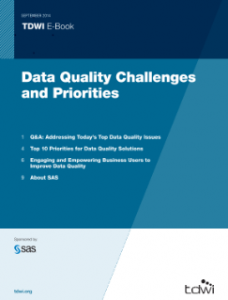This is the first in a two-part series.
In my enterprise consulting days, I frequently encountered folks that ran the data quality spectrum. In this post, I'll describe the five main types of individuals with respect to DQ. See if you recognize any of these types.
The Ignorant
 The Ignorant just plain don't know about DQ. Period. They go about their jobs without any regard to the data consequences of their actions. The Ignorant can be entry-level HR or AP clerks as well as high-level strategy people. They either never figured out the importance of DQ or no one ever explained it to them, never mind held them accountable for their actions and inactions. Ideally, a serious conversation will convert these folks and make everyone's lives easier.
The Ignorant just plain don't know about DQ. Period. They go about their jobs without any regard to the data consequences of their actions. The Ignorant can be entry-level HR or AP clerks as well as high-level strategy people. They either never figured out the importance of DQ or no one ever explained it to them, never mind held them accountable for their actions and inactions. Ideally, a serious conversation will convert these folks and make everyone's lives easier.
The Aloof
Unlike the Ignorant, the Aloof know about about DQ; they just don't care. They often believe that it's the responsibility of IT to cleanse bad data. What's more, they typically become frustrated when application rules prevent them from keying in data willy-nilly. They are fond of blaming "the system" for not letting them indiscriminately enter data.
About ten years ago, I worked on an new ERP implementation at a hospital in the northeastern U.S. I had trained the staff on how the HR module worked, but one woman just didn't seem to get it no matter how much time I spent with her. She would consistently enter incomplete personnel actions (PAs) such as employee promotions, new hires, transfers, and terminations. When I would point out that she had forgotten certain fields, she would shrug and just enter separate/duplicate PAs. In her mind, as long as the information resided in the system, it didn't matter. I explained to her that four termination records for the same employee would grossly inflate company- and department-wide reporting, but she promptly dismissed my points. To paraphrase from Cool Hand Luke, some people you just can't reach.
The Skeptical

To be sure, this is an interesting lot. It's not that the Skeptical doubt the need for high data quality. Often, their objections are more nuanced than that. Perhaps their dubious nature emanates from their jaded experiences (read: that the organization or specific departments don't really make data-based decisions anyway). These folks believe in DQ in theory; it's the practice part with which they have trouble.
In a way, the Skeptical have a point, at least in the short term. After all, what good is data if you don't, you know, use it? This argument ultimately fails to hold water, however, because years of active and passive neglect can't be reversed with a magic button or a new organizational culture. Bad data can take years to cleanse. It's better to promote and maintain a high level of DQ, even if the organization refuses to embrace data-based decisions.
Simon Says
For different reasons, not everyone appreciates the import of DQ. The groups of non-believers run the gamut. In the second part of this series, I'll cover two more archetypes.
Feedback
What say you?





